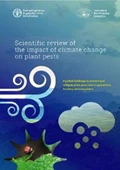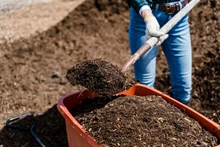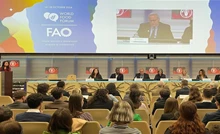
The project, which began in March 2020 in collaboration with the Nature Conservation Center, the Agricultural and Food Ethics Association (TARGET), and the Leading Konya Farmers' Association, ended in February 2023. The project was sponsored by the European Union representation in Turkey, as well as representatives from civil society, public and private sector organizations, universities, farmers' unions, and local governments working on climate change adaptation.
Ecosystem-based solutions, organic waste evaluation, rainfall collecting, and the use of technology were highlighted in the pilot projects in the battle against climate change-related disasters. Furthermore, the "Agricultural Climate Disaster Map of Türkiye" was designed to communicate agricultural reviews using tools such as local news on the effects of climate change on agriculture via written as well as visual resource adaption.
Sharing her insights and experiences with Anadolu Agency (AA) at the end of the project, Nature Conservation Center Soil and Water Program coordinator Melike Kuş stated that because agriculture is an outside activity, it is particularly vulnerable to climate change, and the effects are significantly more severe. She proposed that specialists from various professions collaborate to develop resilience to climatic phenomena.
"Unfortunately, climate-friendly techniques are not universally successful and do not always produce the expected results due to cultural, sociological, and economic factors. Also, farming is a difficult endeavour due to the numerous variables involved "Kuş said. Kuş emphasized that if climate change mitigation measures are not implemented, disasters may occur: "Within the framework of the pilot applications, we are working on the use of compost as mulch and rainwater harvesting."
Mulch application, which is simple on smaller areas, may not be feasible on 300-500 acres. We use 'direct seeding' or limited tillage in this situation. Everything is done at once in this manner, and just 20% of the soil is farmed. This strategy may be appropriate for regions with big acreages, such as Konya. In addition, cover crops can be planted. Not all approaches can be used everywhere, and they may not be cost effective, but there are diverse applications at each size that must be discovered."
"In Antalya, compost was generated from home garbage with the Eastern Mediterranean Research Association," stated project coordinator Işl Arslan elebi, speaking about experiments conducted in the aforementioned provinces. Rainfall was collected, stored, and dispersed using the drip irrigation method. Instruction in the production of vegetables and fruits to meet the needs of a year was also provided."
Concerned about drought and soil erosion in Kenya, Elebi claimed that officials are attempting to facilitate planting while maintaining soil moisture through more environmentally friendly "direct sowing" methods compared to conventional agriculture. This study was carried out in collaboration with the province's Protective Agricultural Association. To minimize soil erosion, wind curtains were made from acacia and oleaster trees, and drip irrigation was carried out in the soil using moisture sensors, while agricultural activities were carried out without the use of water or fertilizer.
Smart agriculture approaches using satellite and drone photos were developed at Anlurfa in collaboration with the Siverek Chamber of Agriculture. The research findings not only gave a list of effective fertilizers and watering methods for plants, but also aided in the diagnosis and treatment of pests. More than 400 manufacturers were informed about the project's findings.
"About 67 incidents of natural disasters were documented in our database, among which droughts, storms, hails, and tornadoes were most prevalent in locations such as Konya, Osmaniye, anlurfa, and Amasya," said Merve Kanak, the project's communication specialist. Storms and tornadoes were particularly severe in Antalya, as were landslides caused by flooding.
Kanak underlined that a caterpillar invasion from Thrace on the borders of Central Anatolia occurred last year, affecting a vast territory from Tekirda to Ankara and inflicting crop output losses in crops such as corn and sunflowers.











